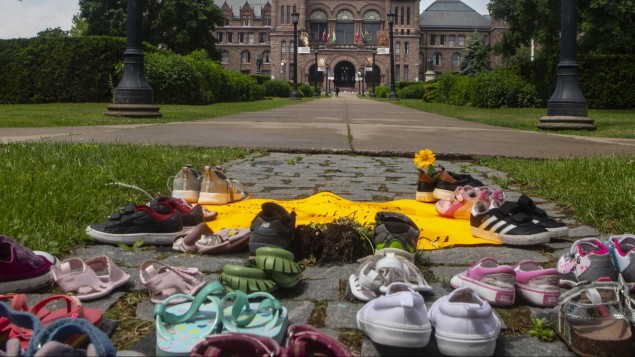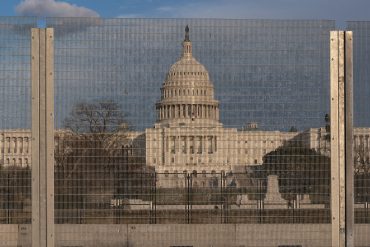-
- Commemoration in front of a government building in the Canadian state of Ontario: The graves of Indigenous schoolchildren again discovered at the site of a former “residential school”. (Symbol Image) (Picture Coalition / Canadian Press / Chris Young)
Once again, hundreds of graves of indigenous children were discovered on school grounds in Canada. They testify to an earlier attempt to wipe out First Nations cultures, says historian Manuel Menrath. To this day, indigenous peoples suffer from this past.
“Residential school” was the name given to the schools to which many indigenous children in Canada were forced out from the 17th century onwards. Many died from illness or poor treatment in facilities. There they wanted to “make a mission” and “civilize” these children. It was not until 1997 that the last of these schools closed.
Historian Manuel Menrath states that the fact that hundreds of graves of Indigenous children have now been found near a former Catholic boarding school for children of indigenous peoples, as it did in late May, is indicative of more intensive educational work. Menrath in his book “Under the Northern Lights” describes the lives of the indigenous people of Canada in detail.
critical education
“Now it’s up to all the pre-residential school premises to check the floors with radar and other measurements to really find the remains of these children who were forcibly evacuated in these schools.”
It is very important for the tribal community. And now officers will work with him too, insists Menrath. Authorities have the money needed to finance radar technology, for example – money that indigenous communities lack.
Originally, the schools were for the descendants of European fur traders and indigenous women. They should not develop into indigenous culture, but be “civilized”.
Missionaries and Colonists in Common Cause
As more and more settlers came to the country, the aim was to re-educate the indigenous people – turning them into Christians and farmers so that they could settle “and are no longer in the way”.
Colonialism and conversion went hand in hand, says Menrath: the colonists needed land to settle down – “and the missionaries, they just wanted to save souls”.
Children were performing very poorly in schools. Home sickness, foreign customs and unfamiliar food, partly from cans, would haunt them.
“They were used to play meat and fish and were severely punished. They were beaten if they used their language.” Those who left the school premises were later imprisoned for it. The historian lists the abuses as, “Some of them were made to sit on electric chairs and jolted with electric sticks.”
Church and State Equally Responsible
Catholic-run houses were administered and financed by the government. The basis is the “Indian Act” of 1876, the law still in force in Canada. The law governs the legal status of First Nations, as most Canadian natives are called today.
Therefore both the church and the government are responsible. Menrath’s report states, “While the Canadian government apologized in 2008 for Indigenous peoples – this cultural genocide – as suffered by the Presbyterian, Methodist and Union churches, the Catholic Church has never officially apologized for it.” Didn’t apologize.”
The discovery of the grave may have made a major contribution to the explanation, as it is now clear that injustices against indigenous peoples continue to this day. The historian is convinced: “I think there is now a real blow through the majority society of Canada.”
New pain from losing identity
About 70,000 children from the former “residential school” are still alive, and many are still suffering psychologically from the consequences of their school days, some of them alcoholics and unable to care for their children.
This has led to a new injustice. Because the Canadian state has taken children away from these survivors of “residential schools”, placed them in foster families or given them up for adoption.
(ml)

Devoted web advocate. Bacon scholar. Internet lover. Passionate twitteraholic. Unable to type with boxing gloves on. Lifelong beer fanatic.







